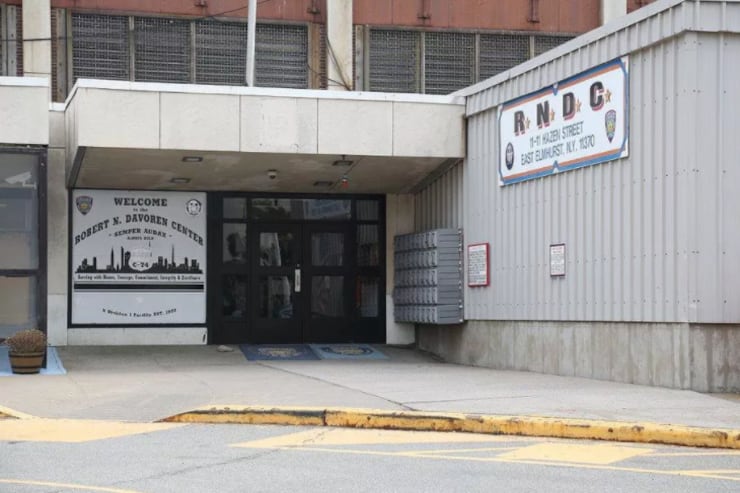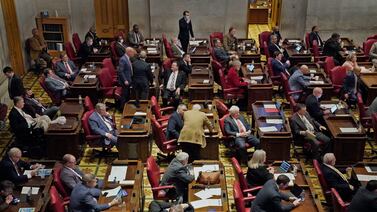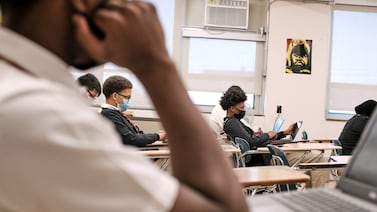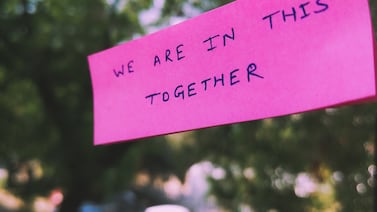This story was originally published on Dec. 16 by THE CITY.
For hundreds of young people on Rikers Island trying to finish high school, even Zoom is out of reach.
Since the pandemic shut down face-to-face learning in March, city jails have yet to set up video conferencing for incarcerated students attempting to continue their education following an arrest.
Kids held at juvenile facilities have also only been able to communicate with their teachers over text chat, THE CITY has previously reported. Child welfare officials earlier this month said they are working to remedy that.
Similarly on Rikers, paper packets and text messages have now replaced in-person enrichment programs and high school classes for 18- to 21-year-olds, the Department of Correction revealed Wednesday.
“They are currently interacting with their teachers through the tablets,” Judy Beale, deputy commissioner of programs and community partnerships at the department, said during an oversight board meeting conducted via videoconference.
“We established a chat function through the tablet where they can communicate by texting back and forth, and that has been going on for several months,” she added.
In place of teaching, detainees are receiving “packets of information,” Beale said.
She blamed the lack of in-person instruction and remote video class on the city Department of Education, noting staff would be needed to manage even remote classrooms.
A spokesman for the department said it will provide those on-site staff for remote learning in the jails once middle and high schools reopen for in-person instruction. Since mid-November, public school students in grades 6 through 12 are currently learning remotely “until further notice.”
“Our staff is delivering live, high-quality remote instruction to our students in the juvenile justice system, and we are working actively to add video and audio capabilities to their school day at the same time that all high schools return for in-person learning,” said DOE spokesman Nathaniel Styer.
“We will be able to provide the onsite educational staff necessary to provide video conferencing to ensure the safety of our students, and we’ll continue to work to expand their communication and educational opportunities,” he added.
Time Is Short
Advocates said the school situation in city jails fails young people at a critical juncture.
“We as a city are denying our already detained young adults access to education within their most developmental period of their brains’ life,” said Five Mualimm-Ak, an advocate for incarcerated people. “That itself is a second sentence of punishment.”
“I can’t imagine a single member of this board doesn’t appreciate the importance of this opportunity to provide a high school education to those who have not finished it yet,” Mary Lynne Werlwas from The Legal Aid Society told the Board of Correction, which makes the rules for city jails.
Supplemental outside service providers who lead educational and other programming at Rikers have not been on the island since the start of the pandemic, Beale confirmed.
Age-appropriate programming to occupy young people is generally seen as a way to reduce violence in jails, make incarceration more tolerable and less mentally damaging, and help prepare inmates for the outside world.
Joe Russo, president of the Assistant Deputy Wardens/Deputy Wardens Association, said the lesson packets do not command detainees’ attention the way remote video classes might.
“Their interest level is always questionable but it’s certainly less when they are on their own,” he said. “They are most likely to have problems and keeping them busy is a good way to control that. They could do online courses. I don’t know why they aren’t doing that.”
Detainees have also been unable to see family members since visitation was canceled in March.
Wednesday’s board meeting was hastily convened for the DOC to request a another “variance,” or rules waiver, allowing it to mix young adults and older inmates, which was granted.
In 2015, the board said jails had to house young people together, but the Department of Correction declined to fully implement the rule it disagreed with.
In September, 40% of young people were still “commingled” with older adults instead of being in designated youth units, according to the Board of Correction.
Last month, however, board members put their feet down, denying a long-granted waiver to the youth housing rule. Since then, the department managed to consolidate all but 28 young inmates, down from 167 in early November, board member Stanley Richards said at the meeting.








